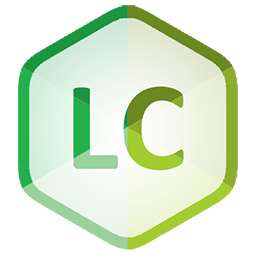
面向 C 的图形界面开发库,可借助 XML 和 CSS 构建简单的跨平台桌面应用
## 目录 - [介绍](#介绍) - [许可](#许可) - [文档](#文档) - [构建](#构建) - [社区](#社区) - [贡献](#贡献) ## 介绍 LCUI 是一个图形界面开发库,主要使用 C 语言编写,支持使用 CSS 和 XML 描述界面结构和样式,可用于构建简单的桌面应用程序。 ### 主要特性 - **C 语言编写:** 适用于体积较小且主要使用 C 语言实现的应用程序,以及偏向使用 C 语言编写简单应用的开发者。 - **Trad 语言绑定:** [Trad](https://github.com/lc-soft/trad) 是一个专为 LCUI 而设计的语言,它能使创建交互式 UI 变得轻而易举。 - **跨平台:** 支持 Windows 和 GNU/Linux 系统,可开发简单的 Windows 桌面应用和通用应用,以及 Linux 桌面应用。 - **XML 解析:** 支持使用 XML 标记语言描述界面的结构,更少的代码量,更直观的表达方式,易于开发和维护。 - **CSS 解析:** 支持使用 CSS 代码描述界面元素的位置、大小、背景、字体、边框等样式,与应用程序的逻辑分离,易于使用和修改。 - **类 HTML 布局:** 与浏览器处理的网页布局类似,但目前只支持块级(block)、内联块级(inline-block)和简单的弹性(flex)布局,如果你有网页开发经验的话会比较容易上手。 - **界面缩放:** 支持通过设置全局缩放比例来让界面适应不同像素密度的屏幕,也支持使用基于屏幕密度的 sp 和 dp 单位表示界面元素的位置和大小。 - **文本绘制:** 支持为文本设置全局字体、行高、水平对齐方式,支持对局部文本块单独设置颜色、背景色、加粗、斜体。 - **字体管理:** 支持加载多个字体文件,支持自定义界面中的标题、正文、引用、强调等类型的文本所使用的字体字族和风格。 - **图片处理:** 提供图片读取接口,支持读取 jpg、png 和 bmp 格式的图片。支持逐行读取,可在读取图片的过程反馈读取进度。 - **触控:** 支持多点触控,但目前只支持 Windows 系统。 ### 缺少的特性 LCUI 是一个个人项目,其主要用途是方便作者能够开发简单的图形界面应用,简单也就意味着功能很少,比如: - 没有硬件加速,图形渲染效率低下。 - 不支持剪切板,你不能选中和复制界面中的文本,也不能从其它程序复制文本到 LCUI 程序中。 - 输入法支持差,在 Linux 中仅支持输入英文字母和符号。 - 当前版本并不支持渲染圆角边框。 - 布局系统简单,不支持网格、表格等布局。 如果你有上述问题的相关解决经验,可以通过提交问题(Issue)或拉取请求(Pull Request)来向我们提供技术支持。 ### 相关项目 想要了解 LCUI 具体能做什么?你可以查看以下项目: - [Trad](https://github.com/lc-soft/trad) - 一个专为简化 C 开发而设计的语言。凭借 LCUI 与其的语言绑定,能使创建交互式 UI 变得更简单。 - [LCUI.css](https://github.com/lc-ui/lcui.css) - LCUI 组件库,包含了一些通用组件和 css 样式。 - [LCFinder](https://github.com/lc-soft/LC-Finder) - 图片管理器,LCUI 的旗舰级应用程序,你可以将它作为参考对象,以此评估 LCUI 的性能、界面效果和开发复杂度是否符合你的需求。 ## 许可 LCUI 采用的开源许可证是 [MIT](http://opensource.org/licenses/MIT)。 ## 文档 - 在线教程:[https://lcui.lc-soft.io/guide/](https://lcui.lc-soft.io/guide/) - 更新日志:[CHANGELOG.zh-cn.md](CHANGELOG.zh-cn.md) 目前还没有 API 参考文档,你可以参考头文件、源代码、示例程序以及作者开发过的相关程序来了解基本用法。 ## 构建 ### 依赖项 如果你想构建全特性的 LCUI,建议安装以下依赖库: - [libpng](http://www.libpng.org/pub/png/libpng.html) — PNG 图像压缩库 - [libjpeg](http://www.ijg.org/) — JPEG 图像压缩库 - [libxml2](http://xmlsoft.org/) — XML 解析器及相关工具集 - [libx11](https://www.x.org/) — X11 客户端库 - [freetype](https://www.freetype.org/) — 字体渲染引擎 如果你的系统是 Ubuntu,可运行以下命令来安装依赖: apt-get install libpng-dev libjpeg-dev libxml2-dev libfreetype6-dev libx11-dev ### 引导 你需要运行 `./configure` (在源码根目录中) 以引导项目的构建。 在最简单的情况下,你可以运行: git clone https://github.com/lc-soft/LCUI.git cd LCUI ./configure 如果未找到 ./configure,请运行 ./autogen.sh 脚本生成它。 在 `./configure` 执行完后,运行以下命令编译源代码并安装 LCUI 的函数库和头文件: make make install 如果需要自定义编译器、编译参数、安装位置等配置,请阅读 [INSTALL](INSTALL) 文件了解详情。 测试和示例程序都存放在 test 目录中,如果需要运行他们请运行以下命令: cd test make 运行 helloworld 示例: ./helloworld ### 在 Windows 中构建 LCUI 主要是在 Windows 系统环境下开发的,目前只提供 Visual Studio 的解决方案文件(.sln),你可以使用 [Visual Studio](https://visualstudio.microsoft.com/) 打开 `/build/windows/LCUI.sln` 文件,然后编译生成 LCUI。如果你用的是其它 IDE,请尝试按该 IDE 的方式创建项目并将源文件添加至项目内,然后编译。 上述的依赖库中除 Windows 系统用不到的 libx11 库外,都可以在 Windows 系统环境下编译生成,具体的编译方法你可以在教程中找到。如果你觉得编译这些依赖库很麻烦,可以使用 [vcpkg](https://github.com/Microsoft/vcpkg) 来安装它们,只需在命令行里输入如下命令: ./vcpkg install freetype libxml2 libjpeg-turbo libpng [发行版](https://github.com/lc-soft/LCUI/releases)的附件列表中一般也会有一个包含所有依赖库的压缩包可供使用。 ## 社区 相信很多人已经习惯于看到那些活跃的开源项目,也习惯于向开源社区索取着各种资源,这些项目有着完善的文档、丰富的示例、活跃的社区还有成群的贡献者一起参与项目,即使自己什么都不用做,他们也能积极的发展下去。然而 LCUI 只是个个人项目,并未拥有这些资源,LCUI 的大多数功能都是按作者的需求而开发的,因此,如果你有什么需求,请先阅读以下内容。 - 遇到问题时请尽量花时间自己独立解决,实在无法解决的话,请再花些时间准备好详细的问题描述,然后按照下面给出的方法提交问题。 - 普通的使用问题,请在[开源中国社区(问答板块)](https://www.oschina.net/question/tag/LCUI)、[SegmentFault](https://segmentfault.com/search?q=LCUI) 或 [Stackoverflow](https://stackoverflow.com/search?q=LCUI) 上提交问题并 @ 作者,这样作者在帮助你解决问题后至少能赚点积分/声望值,还能让搜索引擎多收录一条 LCUI 相关的内容,帮助其他遇到类似问题的人。 - BUG、新功能建议、代码改进建议等核心开发相关的问题请提交至 [Issues](https://github.com/lc-soft/LCUI/issues) 页面中。 - 如果你想提交自己的代码改进方案,请先向作者确认这个方案是否符合要求,确认之后再开始编写代码,务必遵循[现有代码风格](docs/CodingStyle.zh-cn.md)。在代码完成后,请提交拉取请求(Pull Request),让作者决定是否拉取你的分支里的代码并合并至主分支,必要的话请补充单元测试。 - 文档相关问题、需求及改进建议,请提交至 [LCUI-Guide](https://github.com/lc-ui/LCUI-Guide/issues) 项目里。 ## 贡献 LCUI 还有很多需要完善的地方,例如: - 部分头文件设计不合理,依赖太强。 - 部分模块代码耦合度高。 - 标识符命名不够规范。 - 目录规划不够合理。 - 不支持输入法。 - 文档太少。 - 示例太少。 - 组件太少。 由于 LCUI 是一个与作者职业无关的项目,在此项目上投入过多时间对于作者的意义并不大,因此受限于时间成本问题,像图形渲染优化、输入法支持、文档撰写、琐碎小功能等这类耗时长、收益低的工作,现阶段都不会安排在主线分支上。除去这里简单说明的一些待改进的地方外,在 LCUI 的源代码中也会有一些被 FIXME 注释标记的待改进的代码,通常这些注释还会说明为什么改进它,以及怎么改进它,如果你感兴趣,可以留意源代码中的 FIXME 注释内容,或者[直接搜索 FIXME 注释](https://github.com/lc-soft/LCUI/search?q=FIXME&unscoped_q=FIXME)。 本项目是以技术交流为主要目的而开放源代码的,如果你有相关问题解决经验,可以向此项目提供支持,与其他人分享你的经验,但在参与贡献之前,请先阅读[这篇贡献指南](CONTRIBUTING.md)。